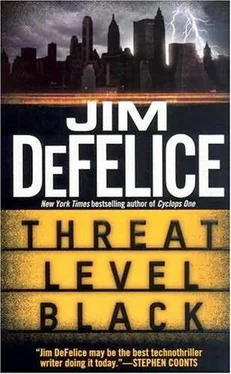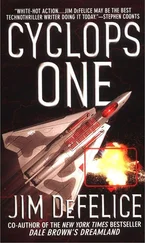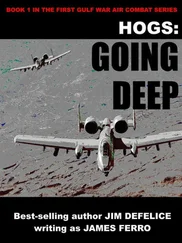Under other circumstances, the jocks might have exchanged some good-natured banter, but the normally loquacious Eagle pilots were under instructions to keep radio traffic to a minimum. The situation in Korea had the Eagles’ unit at its highest alert, and even though the men didn’t know what Howe’s mission was, they surely guessed at his destination.
Even with all that, the flight leader couldn’t resist a whistle when he spotted Howe’s plane in the last rays of sunlight as he climbed through thirty thousand feet.
“At you,” said Howe, initiating the mock encounter. He put the plane on its wing as the F-15s crisscrossed above him, one pursuing while the other orbited west. The brief tangle was over inside of two minutes-about as long as a real furball might have lasted. The two F-15s rocketed back and forth as Howe hit the deck outside of easy radar coverage. Within a few minutes they were headed toward Misawa Air Base. Their radio calls now referred to three flights, as would the landing instructions.
A flight of F/A-22s made a radio call to an AWACS. Orbiting to the south of Howe’s course about seventy-five miles from the Korean coast, the interceptors were both decoys and emergency guard dogs: They and an AWACS plane operating to the east would watch for North Korean fighter action and would sprint to Howe’s aid if necessary.
Howe, meanwhile, had nosed down below one hundred feet, clipping along close enough to sniff the foam from the waves. He checked his fuel-still doing good-checked the rest of his instruments, studied the radar warning receiver or RWR, reviewed his course. Everything was in the green.
Nothing to do now but fly into the gathering darkness. And so he did.
Thirty-two minutes later Howe slid over the Russian coast, ducking past the blunt fingers of an early-warning radar and pushing into North Korean territory. While most of the North Korean radar system was aimed at Seoul and the coast, there were radars and some SAMs here and they couldn’t be ignored. Howe’s course had been painstakingly worked out to run through the gaps, but he had to fly very low, hiding the sharp corners of his aircraft in the clutter of radar returns thrown off by the ground. While Howe’s plane carried electronic countermeasures that could confuse the radars, using the jammers would be like turning a flashlight on in a darkened room: The Koreans would know he was there. And so he threaded a crooked needle as he flew, staying low and near mountainsides. The need to follow a precise course and the danger that he was in were a blessing in a way: They focused his thoughts entirely on his ship and what was around him. While immensely fatiguing, in another way the sheer concentration and immersion in what he was doing relaxed him. His muscles moved in an unconscious way, his eyes gathering data without conscious thought, his body and soul funneled into the moment. Waypoint after waypoint, Howe moved inextricably toward his goal. Nothing outside of the tense cocoon of his plane and the surrounding defenses disturbed him; the world consisted only of the Berkut and the people who would destroy it if they could.
And then he was fifty miles from his destination, just under ten minutes from putting down.
Howe checked the radio unit and broadcast the Russian message, which had been prerecorded on a special CD. Then he turned up the volume and double-checked that the radio was locked into the command frequency, ready to receive the signal on what to do.
Dr. Park got up from the chair and went to the window, bending his head to look up at the sky past the nearby mountainside. A few faint stars glimmered in the darkness; he thought of the folktale about the cowherd and the weaver, the constellations separated by a father’s jealousy.
Why was he here? The unit Dr. Park had been told he would help had not arrived; in fact, there were no more than a dozen men all told, if that. The camp seemed as forlorn as any Dr. Park had ever seen. The airfield a few miles away where the tests were supposed to be held was emptier still, abandoned for months if not years. The open hangar at the far end of the runway area held two small aircraft, the remains of a UAV project that until now Dr. Park had only heard rumors about, but the crews who cared for the planes, as well as the men who had developed them, were absent. The other buildings there were falling in on themselves.
The buildings here were not much better. The rooms in his small bungalow smelled of mildew. A cook made meals only once a day; the rest of the time Dr. Park had to forage for food in the large kitchen in the administrative building, apparently as the others did. The few men he had contact with were young soldiers who answered questions with shrugs.
Had he been sent here as punishment for Moscow?
He did not think this could be so, for surely punishment would be more severe. It seemed more that he had simply been forgotten. He was free to wander back and forth and spend his hours playing one-man Ping-Pong against the folded side of a game table. A soldier or two was never far away-one had gone with him to the airfield the other day, and down the road for a walk the day before-but none ever stopped him.
Most likely the situation was a product of the growing disarray in the country, the confusion between different branches and departments. Even in this isolated place Dr. Park saw it: A dignitary had arrived yesterday and yet received no official greeting; his car had swung in the gate and gone up to the main administration building, and if the man had even gotten out, let alone taken a tour of the place, Dr. Park did not know about it.
Dr. Park decided he would take a walk. He began thinking of the folktale again, the cleverness of coming up with an earthly story to explain the movement of the heavens. Dr. Park had always been interested in the stars; he saw it as an extension of his interest in science and math. He had vaguely hoped that if he was successful in leaving for America, he would be able to pursue those interests somehow. Perhaps there was a space project he might be assigned to, or some department dealing with the study of the stars. But the failure in Moscow -his own failure, he knew-had sealed his fate. He would live out his days as an engineer for the state, as preordained.
He walked around the perimeter of the camp, admiring the stars. Tomorrow he would find the camp director or someone else in authority and make inquiries, he decided. If he was not needed, perhaps it would be possible to visit his mother’s cousin in Dao; she was his last claim on family, though it was doubtful she even knew that he was there.
Dr. Park took one last look at the stars before going back inside his hut. Now he thought about his grandmother when she had told him the folktale of the stars that could meet only once a year. He felt again her warm embrace, the only memory he had now of the day his mother and father died together.
The memory lingered as he crossed the threshold of the hut. It stayed with him even as the thick blade of a hatchet smacked into the back corner of his skull, sending the life from his body.
Tyler leaned across the rock, training the nightscope on the runway. The airfield was practically unguarded, with only two men watching the road at the south. It seemed to have been used as a storage area but had been abandoned sometime before. The army camp where their contact was living was two miles away. At one time a cross between an army base and a factory, it, too, seemed almost abandoned: There were skeleton posts around the perimeter, with no more than a dozen guards. A three-man team had already scouted it; they had a way in if their man didn’t show. Another team was sitting near the field itself, ready to intervene if the pilot needed help.
Читать дальше












